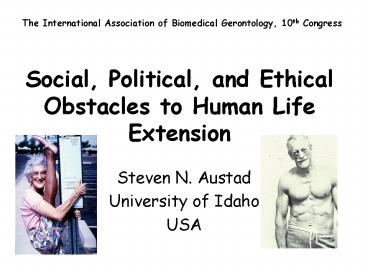Social, Political, and Ethical Obstacles to Human Life Extension PowerPoint PPT Presentation
1 / 30
Title: Social, Political, and Ethical Obstacles to Human Life Extension
1
Social, Political, and Ethical Obstacles to Human
Life Extension
The International Association of Biomedical
Gerontology, 10th Congress
- Steven N. Austad
- University of Idaho
- USA
2
Advising the President on ethical issues related to advances in biomedicalscience and technology Advising the President on ethical issues related to advances in biomedicalscience and technology Advising the President on ethical issues related to advances in biomedicalscience and technology
Leon R. KassChairman "Among the most urgent of the Councils intellectual tasks is the need to provide an adequate moral and ethical lens through which to view particular developments in their proper scope and depth."
3
Longisin
Longisin
Longisin
Lo
Longisin
Longisin
Longisin
4
Economic Realities of Aging Research
- FY 2004 NIH Budget
- 10.3 Heart, Lung, Blood
- 17.1 Cancer
- 15.6 Infectious Diseases
- 3.6 Aging
5
Why??
- (1) People are seriously ambivalent about
medically extending life
6
Why The Ambivalence?
- The Fairness Argument
- The Malthusian Argument (Resource shortages)
7
Life Expectancy at Age 65
8
Projected Federal Budget Outlays for Medicare
Socal Security
9
(No Transcript)
10
Who Will Pay for Retirement Benefits?
11
Retirement Age Has Been Moving in the Wrong
Direction
12
On the Other Hand
- We Dont
- Encourage smoking
- Renounce antibiotics and vaccines
- Destroy insulin supplies
- Reward reckless driving
- Refuse to treat heart attack victims
13
A Tactic/Scientific Mistake
Our Focus has Been on Length of Life
14
Aging Functional Loss Over Time
Age 17 Age 52
15
Aging Functional Loss Over Time
Retarding Senescence
Percent Function Remaining
Age
Age
(after Nathan Shock)
16
Aging
- Gradual and progressive loss of function over
time, leading to - Increasing incidence of death and disease
- Decreased health and well-being
17
Mission StatementUS National Institutes of
Health
- Our mission is science in pursuit of
fundamental knowledge about the nature and
behavior of living systems and the application of
that knowledge to extend healthy life and reduce
the burdens of illness and disability.
18
Mission StatementUK Medical Research Council
- To encourage and support high-quality research
with the aim of maintaining and improving human
health
19
What is Health?
- Health is a state of complete physical, mental,
and social well-being and not merely the absence
of disease or infirmity.
Preamble to the Constitution of WHO, 1946
20
What is Health II?
- Possessing the physical capability to do the
activities in life that one wishes to do.
21
Improving Health (by Delaying Aging) Will Affect
ManyChronic Conditions(Sources National Center
for Health Statistics)
22
(No Transcript)
23
ReadySet
24
Why??
- People are seriously ambivalent about medically
extending life - Aging has no built-in constituency of energized,
grieving survivors
25
Why??
- People are seriously ambivalent about medically
extending life - Aging has no built-in constituency of devoted,
grieving survivors - The naturalistic fallacy is common
26
The Way It Was(sources Lovejoy, et al.1977 Neel
Weiss, 1975 Gage, 1988)
27
Social Expectations Were Based on Short
Expectations of Life
- Richard II at 14 years old pacified Wat Tylers
troops with a speech. - At 14, Alexander Hamilton set numerous rules for
sea captains who traded with his employers firm.
- Alexander the Great, a teenager at the time, led
armies in battle. - A warriors young page might be made a knight at
12.
From Barzun, Dawn to Decadence (2000),
Published when Barzun was 93
28
Good Riddance to the Way It Was(source for
recent data USDHHSSSA)
29
(No Transcript)
30
Rationale for the Effort to Slow Human Aging
- Goal is improvement and preservation of health,
not (necessarily) the prevention of death - That goal is consistent with all disease-based
biomedical research efforts - Continuing to increase longevity by disease-based
advances alone could be a major catastrophe - 25 - 50 of people over 85 have disabling
dementia - Slowing aging is a much more effective approach
to preserving health than treating individual
diseases

